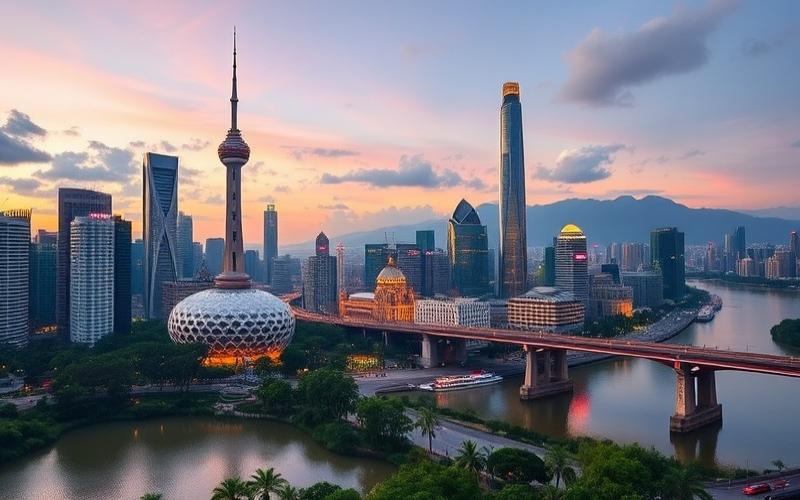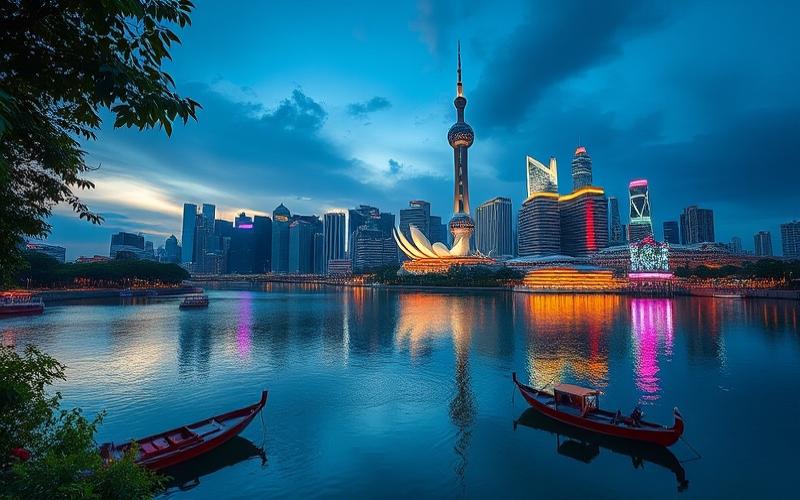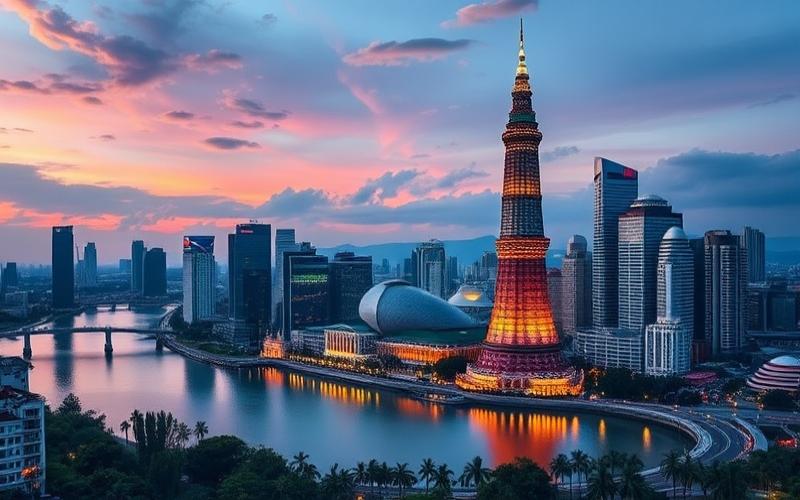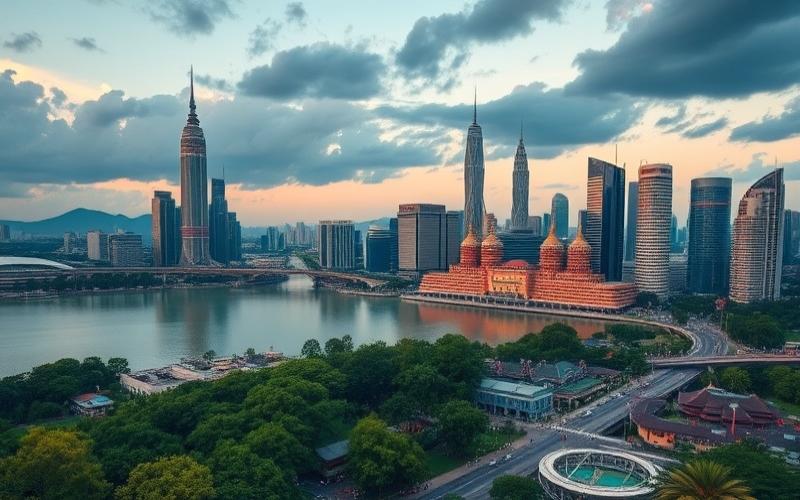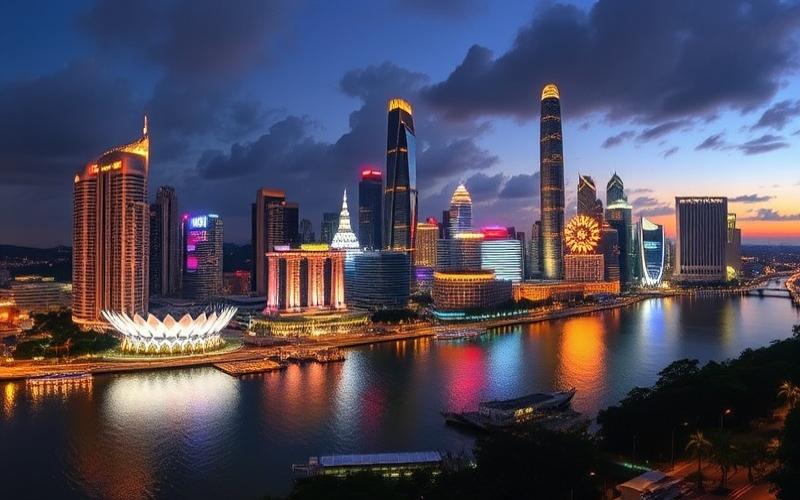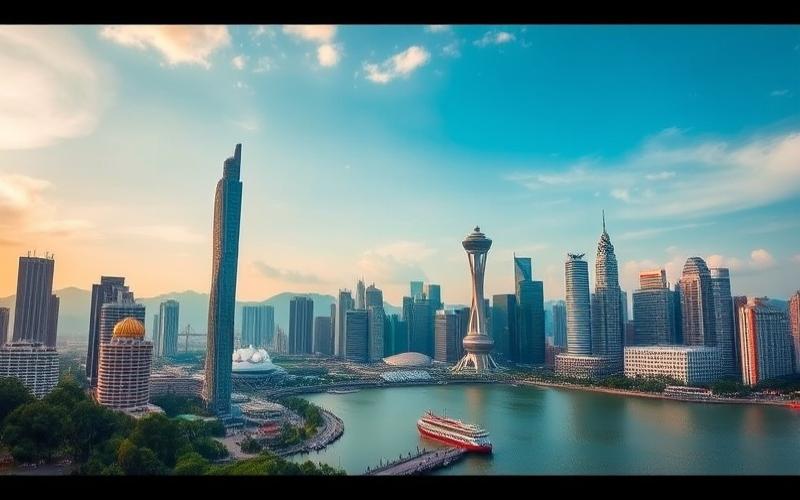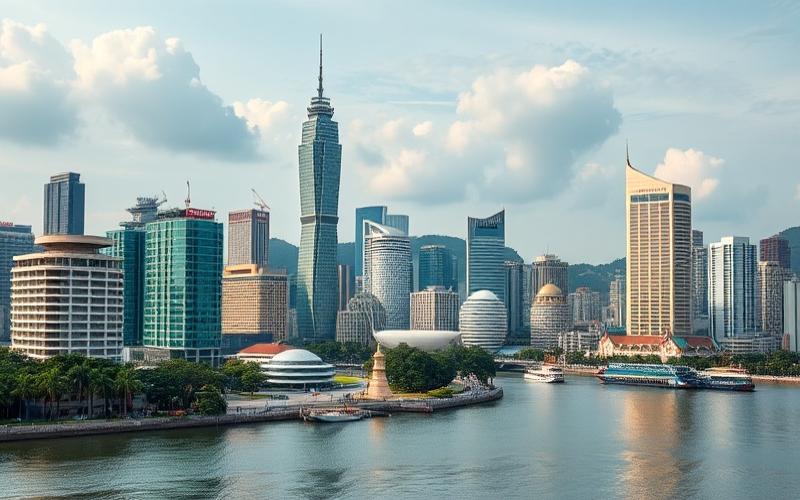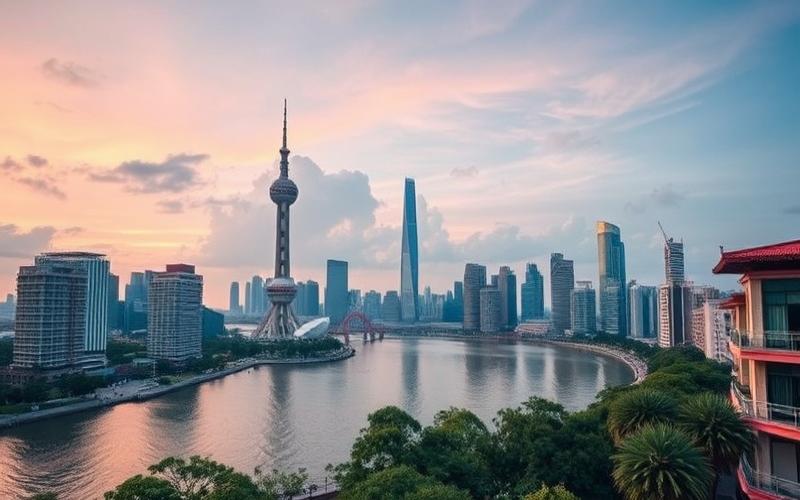
 Published on and written by Cyril Jarnias
Published on and written by Cyril Jarnias
Singapore, this dynamic and cosmopolitan city-state, is far more than just an economic crossroads in Southeast Asia. It has now established itself as a prime destination for savvy real estate investors, particularly in the vacation rental sector. With its unique blend of modernity and tradition, Singapore attracts millions of visitors each year, creating a thriving market for short-term rentals. Whether you’re a seasoned investor or a property owner seeking new opportunities, let’s dive together into the secrets of this promising market and discover how to leverage its exceptional potential.
A Goldmine for Property Owners: The Advantages of Vacation Rentals in Singapore
Vacation rentals in Singapore aren’t just a passing trend—they’re a genuine goldmine for savvy property owners. This rental format offers flexibility and profitability that few other real estate investments can match. Singapore, with its constant influx of tourists and expatriates, creates an ideal environment for this type of rental.
One of the main advantages of vacation rentals in Singapore is the potential for high income. Unlike traditional long-term rentals, vacation rentals allow owners to set higher rates, particularly during peak demand periods. For example, during the Singapore Formula 1 Grand Prix, rental rates can easily double or even triple. According to data from AirDNA, a platform specializing in short-term rental market analysis, the average monthly revenue for a one-bedroom apartment in Singapore can reach 3,500 SGD (approximately 2,400 EUR), which is significantly higher than income generated by conventional rentals.
Another major advantage is the flexibility offered to property owners. Vacation rentals allow you to maintain control over your property, giving you the opportunity to use it yourself whenever you wish. This flexibility is particularly appreciated by foreign investors who can enjoy their property during their stays in Singapore while generating income from it the rest of the time.
Furthermore, vacation rentals offer an excellent opportunity for risk diversification. By hosting a variety of tenants for short stays, owners don’t depend on a single long-term tenant. This diversification significantly reduces the risk of extended vacancy periods and ensures a more stable income stream.
Finally, let’s not forget the rewarding aspect of vacation rentals. By welcoming travelers from around the world, owners have the opportunity to create unique and memorable experiences. This enriching cultural interaction can be a source of personal satisfaction that goes well beyond mere financial considerations.
Good to Know:
Vacation rentals in Singapore offer potentially higher income than traditional rentals, great flexibility for property owners, risk diversification, and an enriching personal experience. With average monthly revenue reaching up to 3,500 SGD for a one-bedroom apartment, it’s a particularly attractive option for investors.
The Art of Management: Maximizing Your Property’s Potential in Singapore
Effectively managing a vacation rental property in Singapore is a true art that can make all the difference between a mediocre investment and a resounding success. In this city-state where excellence is the norm, quality management is essential to stand out in a competitive market.
The first crucial step is presenting your property. In Singapore, where luxury and design are omnipresent, your property must be impeccable and attractive. Investing in quality furniture, careful decoration, and modern amenities can significantly increase your property’s appeal. According to a study by PropertyGuru, one of Singapore’s leading real estate portals, well-furnished and decorated properties can command rates up to 20% higher than similar but less well-presented properties.
Managing bookings and customer communication is another crucial aspect. In a fast-paced world, especially in Singapore, responsiveness is key. Quickly responding to inquiries, efficiently managing bookings, and ensuring clear communication with guests can greatly improve your occupancy rate and reviews. Many property owners in Singapore use automated management tools to optimize this process. For example, platforms like Guesty or Hostaway allow centralizing bookings from different sites, automating responses, and effectively managing availability calendars.
Regular property maintenance is also paramount. In Singapore, where cleanliness standards are particularly high, professional cleaning between each stay is essential. Additionally, regular preventive maintenance can avoid costly long-term problems. According to data from Singapore’s Urban Redevelopment Authority (URA), well-maintained properties retain their value better and may even see their prices increase faster than the market average.
Another important aspect of management is rate optimization. In Singapore, where the market is dynamic and fluctuating, static pricing isn’t optimal. Using dynamic pricing tools allows you to adjust your prices based on demand, local events, and seasonal trends. For example, during the Singapore Food Festival in April, or the Formula 1 Grand Prix in September, rates can be significantly increased. Tools like PriceLabs or Beyond Pricing are commonly used by property managers in Singapore to optimize their income.
Finally, don’t forget the importance of reviews and ratings. In Singapore, where reputation is paramount, good reviews can make all the difference. Encourage your guests to leave positive reviews and respond professionally to all feedback, whether positive or negative. According to a Booking.com study, 91% of travelers consider reviews important when choosing accommodation.
Good to Know:
Effective management of your vacation rental property in Singapore involves careful presentation, efficient booking management, regular maintenance, dynamic pricing, and special attention to guest reviews. A well-managed property can command rates up to 20% higher and see its value increase faster than the market average.
Vacation rental regulations in Singapore are a complex and constantly evolving subject. To succeed in this field, it’s crucial to understand and strictly comply with local laws, which are among the strictest in the world regarding short-term rentals.
The main regulation to know is the minimum rental duration. Currently in Singapore, renting private residential properties for less than three consecutive months is illegal, except with specific permission from the Urban Redevelopment Authority (URA). This rule, implemented in 2017, aims to preserve the residential character of neighborhoods and limit potential disturbances for permanent residents. For HDB properties (public housing), the minimum rental period is even longer, set at six months.
However, the Singaporean government has recently shown signs of openness toward short-term rentals. In March 2023, the URA announced it was considering relaxing rules to allow short-term rentals in certain designated areas, subject to approval from the majority of building residents. This potential development could open new opportunities for investors, while maintaining a strict regulatory framework.
While awaiting these changes, property owners must be extremely vigilant. Penalties for non-compliance with these rules are severe. Offenders can face fines of up to 200,000 SGD (approximately 138,000 EUR) or imprisonment for up to 12 months. Additionally, HDB properties can be confiscated in case of repeated rule violations.
It’s also important to note that even if short-term rentals become legal in certain areas, they will likely be subject to strict regulations. For example, there might be limits on the number of nights per year a property can be rented short-term, as is the case in other cities like Paris or Amsterdam.
Property owners should also be aware of the tax implications of vacation rentals. In Singapore, rental income is taxable and must be declared to the IRAS (Inland Revenue Authority of Singapore). The tax rate depends on the owner’s residency status and the amount of income generated.
Finally, it’s crucial to obtain appropriate insurance. Most standard home insurance policies don’t cover short-term rentals. Property owners must therefore purchase specific insurance to cover risks associated with this activity. Companies like AXA or NTUC Income offer policies specifically designed for short-term rentals in Singapore.
Good to Know:
Vacation rentals in Singapore are currently prohibited for durations under three months for private properties and six months for HDBs. Regulatory changes are being considered, but property owners must remain vigilant as penalties for non-compliance are severe, with fines up to 200,000 SGD. It’s essential to stay informed about regulatory developments, declare your income, and obtain appropriate insurance.
Winning Strategies: Maximizing Your Success in Singapore Vacation Rentals
To succeed in Singapore’s vacation rental sector, simply owning a property and listing it for rent isn’t enough. You need to adopt a strategic and innovative approach to stand out in this highly competitive market. Here are some key strategies to maximize your success.
First, location choice is crucial. In Singapore, certain neighborhoods are particularly sought after for vacation rentals. According to PropertyGuru data, areas like Orchard Road, Marina Bay, and Sentosa are highly sought by tourists and expatriates on short stays. These areas offer excellent profitability potential, with high occupancy rates and premium pricing. For example, a one-bedroom apartment in the Orchard area can rent for an average of 250 SGD per night, compared to 150 SGD in less central areas.
Personalizing your offering is another key success factor. In Singapore, where competition is fierce, it’s essential to create a unique experience for your guests. This can include decorating your property with local design elements, offering additional services like personalized guided tours or local cooking classes. According to an Airbnb study, accommodations offering unique or local experiences have a 24% higher booking rate than standard accommodations.
Smart use of technology can also make a big difference. Installing smart locks, connected thermostats, or state-of-the-art entertainment systems can greatly enhance your guests’ experience. Additionally, using automated management tools like Guesty or Hostaway can help optimize your operations and increase profitability. According to a Rentals United study, property owners using automated management tools see an average 15% increase in their income.
Implementing an effective digital marketing strategy is also crucial. With strong competition in Singapore, it’s important to have a solid online presence. This includes professional photos of your property, detailed and attractive descriptions, and active social media presence. Using local SEO techniques can also help attract more guests. According to a Booking.com study, 72% of travelers consider quality photos the most important factor in their booking decision.
Finally, creating strategic partnerships can be an excellent way to boost your business. Collaborating with local travel agencies, event organizers, or companies can help attract regular clientele. For example, if your property is located near Singapore Expo, you could specifically target business travelers attending conferences and trade shows.
Don’t forget the importance of flexibility either. In a market as dynamic as Singapore’s, being able to quickly adapt to demand changes is crucial. This might involve adjusting your rates based on local events, offering discounts for extended stays during off-peak periods, or even offering medium-term rental options to adapt to current short-term rental restrictions.
Good to Know:
To succeed in Singapore vacation rentals, focus on sought-after locations like Orchard Road or Marina Bay, personalize your offering to create a unique experience, use technology to optimize your management, implement an effective digital marketing strategy, and create strategic partnerships. Properties offering unique experiences have a 24% higher booking rate, and using automated management tools can increase income by 15% on average.
Conclusion: Seizing the Singapore Opportunity
Vacation rentals in Singapore represent an exceptional opportunity for savvy real estate investors. Despite current regulatory challenges, this market’s potential remains immense, especially in light of contemplated regulatory developments. Singapore, with its status as a global economic hub, constant influx of visitors, and reputation for excellence, offers fertile ground for those willing to navigate its complex but promising waters.
Success in this field requires a strategic approach, deep understanding of the local market, and a willingness to constantly innovate. Successful property owners are those who manage to offer a unique experience, effectively manage their property, and quickly adapt to market and regulatory changes.
Although current short-term rental restrictions pose challenges, they also create opportunities for those willing to think creatively and position themselves strategically for the future. With the potential relaxation of regulations, those who have already established a strong market presence will be best positioned to capitalize on new opportunities.
Ultimately, the key to success in Singapore vacation rentals lies in the ability to deliver exceptional value to guests while skillfully navigating the regulatory and competitive landscape. For those willing to take on this challenge, the rewards can be substantial, both financially and in terms of personal enrichment.
Good to Know:
Vacation rentals in Singapore offer high profitability potential despite current regulatory challenges. Success in this field requires a strategic approach, effective management, and adaptability. With potential regulatory evolution, those who position themselves now will be best placed to benefit from future opportunities.
Disclaimer: The information provided on this website is for informational purposes only and does not constitute financial, legal, or professional advice. We encourage you to consult qualified experts before making any investment, real estate, or expatriation decisions. Although we strive to maintain up-to-date and accurate information, we do not guarantee the completeness, accuracy, or timeliness of the proposed content. As investment and expatriation involve risks, we disclaim any liability for potential losses or damages arising from the use of this site. Your use of this site confirms your acceptance of these terms and your understanding of the associated risks.


